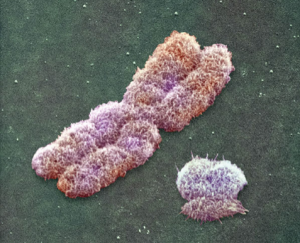 Geneticists, researchers, and patients joined in celebration over last week’s unanimous Supreme Court ruling involving the BRCA1 and BRCA2 genes, colloquially referred to as the “breast cancer genes.” The Supreme Court ruled that Myriad Genetics could not patent the BRCA1 and BRCA2 sequence of genes, because patents cannot be placed on that which is created organically in nature. This decision opens the door for researchers outside of Myriad Genetics to study these genes, providing more opportunities to discover early signs of breast cancer susceptibility. Karuna Jaggar, Breast Cancer Action’s Executive Director reported that this ruling was, “a tremendous victory for women with a known or suspected inherited risk of breast cancer. Today, the Court righted a wrong and has put patients’ health before corporate profits.”
Geneticists, researchers, and patients joined in celebration over last week’s unanimous Supreme Court ruling involving the BRCA1 and BRCA2 genes, colloquially referred to as the “breast cancer genes.” The Supreme Court ruled that Myriad Genetics could not patent the BRCA1 and BRCA2 sequence of genes, because patents cannot be placed on that which is created organically in nature. This decision opens the door for researchers outside of Myriad Genetics to study these genes, providing more opportunities to discover early signs of breast cancer susceptibility. Karuna Jaggar, Breast Cancer Action’s Executive Director reported that this ruling was, “a tremendous victory for women with a known or suspected inherited risk of breast cancer. Today, the Court righted a wrong and has put patients’ health before corporate profits.”
Prior to this ruling, bio-tech conglomerate, Myriad Genetics, held patents on the BRCA1 and BRCA2 genes, monopolizing the research that can be done on these genes, which are strong indicators of susceptibility to breast cancer. Myriad had used their patents to come up with its BRACAnalysis test, which searches for specific mutations in these cancer predisposition genes. Women who show these mutations have a three to seven times greater risk of developing breast cancer. Myriad’s previously established patents on these genes gave them exclusive rights to use this genetic test on these genes. Now that the BRCA1 and BRCA2 genes are open to outside researchers, scientists can use these genes to determine increased risks of patients who may develop breast cancer, ovarian cancer, and other cancers that these genes may help indicate.
Angelina Jolie recently made headlines for deciding to voluntarily undergo a double mastectomy after learning of her own BRCA genes' mutations. Jolie had paid a high price for this test, since Myriad had a monopoly on the market, driving up the cost. So what does this mean for the average, non-Angelina Jolie woman? Well, now this test will be widely available for more women at a more affordable price (we don’t all have as deep of pockets as Jolie). This ruling will not only open the door for more opportunities for preventative screenings for breast cancer, but it will set a precedent for the scientific community to collaborate on research towards the common good.
For more information on this court ruling, please refer to this posts's sources found here and here.

 An estimated 848, 000 men and 790,000 women will be diagnosed with some form of
An estimated 848, 000 men and 790,000 women will be diagnosed with some form of 